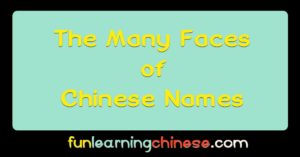Why do Chinese people choose English names?
Every Chinese person I have met has had an English name. Whether they were living in Taiwan, living in the United States, or on a cruise ship, each one of them has introduced themselves by their English name. They would only tell me their Chinese name when I asked. I would try to say it, and would sometimes get it correct, but they seemed to want me to use their English name.
I think this is partly because the tones are so important in Chinese. English speakers who are not fluent in Chinese almost always mangle Chinese names. This may not seem like a big deal to English speakers, whose names are not so closely linked with meanings. English speaking parents may look at meanings when they choose a name, but even names that are clearly based on words are not thought of as more than names most of the time. And if they are pronounced with one accent or another, it doesn’t change the meaning of the name.
The typical personal name for a Chinese person is actual words, chosen for their particular meanings. If they are said with wrong tones, their meaning is at best wiped out and at worst turned into something undesirable. It is very important to them than you say their names correctly. Exactly which character is used is also important, because this is where the very specific meaning of the name comes from.
Turning English language names into Chinese names
Sometimes English names are translated into Chinese characters and sounds to communicate them to Chinese speakers. When this is done, there is usually an attempt to mimic the English sounds, at least as the Chinese speaker hears them and can say them. For instance, I read a Chinese version of The Old Woman in the Shoe and it had all the children’s names in Chinese form. However, I would only have recognized a few of them without my tutor telling me which English name they were supposed to represent.
When this sound based translation is done and the name will be written down, the translator usually also tries to choose characters that have reasonable meanings. My tutor has translated my first name, Laura, as
羅拉
ㄌㄨㄛˊ ㄌㄚ
(luó lā)
gauze, silk + to pull/to play an instrument with a bow
Since I am dedicating my latest Fun Learning Chinese book to two of my granddaughters, my tutor also gave them Chinese names.
Tehya is 緹雅 ㄊㄧˊ ㄧㄚˇ (tí yǎ)
緹 ㄊㄧˊ (tí) orange-red silk
雅 ㄧㄚˇ(yǎ) elegant
So I can think of her name as elegant orange-red silk
Tahlia is 塔莉雅 ㄊㄚˇ ㄌㄧˋ ㄡㄚˇ (tǎ lì yǎ)
塔 ㄊㄚˇ (tǎ) pagoda, tower
莉 ㄌㄧˋ (lì) jasmine
雅 ㄧㄚˇ(yǎ) elegant
The last character is the same, which is fun, since they are twins. I can think of Tahlia’s Chinese name as elegant jasmine tower.
How personal Chinese names are written
Most people are aware that Chinese names are said (and written) with the surname first, followed by the personal name. When Chinese speakers write English names with Chinese characters the standard thing to do is retain the original English order of the names. They also add a period and a space after the first name, before adding the last name. So my full Chinese name is written as
羅拉. 布拉傑特
布 ㄅㄨˋ (bù) cloth, to declare, to announce
拉 ㄌㄚ (lā) to pull, to play an instrument with a bow
傑 ㄐㄧㄝˊ (jié) heroic, outstanding person
特 ㄊㄜˋ (tè) special, unique
If you use a person’s Chinese name frequently, it will be easier to remember. It can be a fun way to practice the correct tones.
Geographical names
It gets more difficult when we get into geographical names. These have a wide variety of derivations. I talk about Washington State in my book.
華盛頓州
This is a combination of a sound alike phrase for Washington, plus the Chinese word meaning province or state.
(華盛頓)(州)
(ㄏㄨㄚˊ ㄕㄥˋ ㄉㄨㄣˋ) (ㄓㄡ)
(huá shèng dùn) (zhōu)
(Washington) (province, state)
It is not a place name I use much in conversation and you can see that visually it doesn’t resemble Washington, so it is challenging to remember it. Fortunately, my translator app can usually help me with geographical names. Still, it is always harder to remember the ones that are sound based off of the original language of a country! Like Spain is España, so the Chinese is
西班牙
ㄒㄧ ㄅㄢ ㄧㄚˊ
(xī bān yá)
Translating meanings versus just borrowing sounds
Some names are titles so the meaning of the title is more important than making it sound like the English words. This is usually the case with book or movie titles/names. Often this requires capturing the concept in a way that is understood in Chinese, rather than just literal translation. Many movie titles are not even close to the English title because it wouldn’t appeal to the Chinese population otherwise. (This is not just peculiar to Chinese. Some movie titles are even changed between English speaking countries because the connotations and idioms are different.)
The name of my book in English is A Million Rocks. The concept of “about a million” is not expressed in quite the same way in Chinese. For starters, one million is spoken of as 100 ten thousands.
數以百萬計
(數)(以)(百)(萬)(計)
(ㄕㄨˋ) (ㄧˇ) (ㄅㄞˇ) (ㄨㄢˋ) (ㄐㄧˋ)
(shù)( yǐ) (bǎi) (wàn) (jì)
(number, quantity)(by means of)(hundred)(ten thousand, myriad)(to count)
When we lived in Taiwan 台灣 , I remember several commercials that played on the concept of 百萬 ㄅㄞˇ ㄨㄢˋ (bǎi wàn) “a million,” so I have the advantage of that to help it stick in my head.
Learning to recognize Chinese names in written text
When reading in Chinese characters, there is no capitalization, so the only way to recognize names is to understand the context in the whole sentence. After you have familiarity with some basic vocabulary, it gets a bit easier. Even though Chinese names are made of out Chinese words, they probably won’t make sense as words in the middle of the sentence. Plus, names are often attached to adjective markers or other category designations such a market or country.
Don’t let Chinese names frustrate you. Try thinking of them as hidden codes in the sentences, as well as an interesting way to be exposed to fun and poetic characters. Shanghai 上海 basically means Oceanside. The Chinese name for American of 美國 is both a sound word and means “beautiful country.” The name for Hawaii 夏威夷 means “powerful summer tribe.” There is a lot of fun that can be had learning Chinese characters with names!


